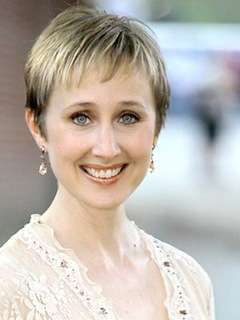|
Back
Musically, the Undark Ages Philadelphia
Presbyterian Church of Chestnut Hill
09/25/2011 -
By Medieval Composers & Writers: The Bawdy Bard, songs and texts
Leslie Johnson (soprano), Maren Montalbano (mezzo), Steven Bradshaw (tenor), Colin Dill (bass)
Gwyn Roberts (recorder), Rachel Cama (viola da gamba), Mark Rimple (lute), Choral Arts Philadelphia, Matthew Glandorf (conductor)

L. Johnson (Courtesy of Lyric Fest)
Lyric Fest opened their ninth season in a new venue for them - the Helen Corning Warren theater at the Academy of Vocal Arts - with The Bawdy Bard a survey of music from of medieval composers which wends its way into baroque resplendence of Henry Purcell. With themes of love, desire, lust and all around canoodling in the middle ages seems like it would play out fast, but it was a sumptuous feast of unexpected musical breadth and an illuminating archive.
The four vocal soloists Leslie Johnson, Maren Montalbano, Steven Bradshaw and Colin Dill performed with the estimable Choral Arts Philadelphia. Conductor Matthew Glandorf is so at ease igniting this material with detailed authority and the musicians playing on period instrument with troubadour esprit. Jim Bergwall, a local Shakespearean, narrated short, often ribald thematic passages with well-chosen prologues with passages from Shakespeare, Thomas Wyatt, verse from the Carmina Burana and everybody’s dark ages favorite libertine, Anonymous.
Bergwall’s broken olde English in Chaucer text is a marvel of character and elocution of a dead language.
Also pushing the envelope of dead on authenticity was “Sumer is Acumen In” a Medieval English ditty with unironic ‘cuckoo’ chirps in the refrains. That was quickly followed up by “L’autrier jost’una sebissa” a 12th century pastorale by Marcabru sung by Montalbano and Dill made it a saucy mezzo and basso duet.
“Le Chant des oiseaux” from the 14th century by Clément Janequin is an a capella quartet for the soloists who all displayed both silky technique in the vocal overlays and crisp interlocks in the transitional phrases.
“A Chantar” by Beatriz de Dia had a world music quality, with Ms. Cama’s viola pulsing like a sitar and Johnson’s silvery soprano hovering. This cross-cultural surprise was echoed with Rimple’s “Nouveau Chanson des Oiseaux” composed eight years ago, with themes of chastity but fitting right into this period work with its atmospherics that are both ethereal and earthy. Rimple captivates with an obvious complete understanding of early musical structures. Inspired as Anonymous was, by birds, Rimple builds a medieval song and inserts oblique choral sections as a harmonic field.
“Elslein Quodlibet” or “whatever pleases” by Swiss Renaissance composer Ludwig Senfl, sounded serene and sacred if you didn’t speak German and understand that this is a lusty tale of peasants and trysts in the woods. This was also highlighted by great narrative projection by the musicians.
Steven Bradshaw captured everyone’s heart singing the a capella Latin for “Can Ve Lauzeta” a troubadour song from the 12th century by Bernart de Ventadorn. “Alas! I thought I knew so much/About love, and I know so little!” a lover’s confession and lament. Gorgeous Gregorian chanty lines spike toward dissonance. The sentiments and vocal ironies all delivered in countertenor and even castrati range by Bradshaw with luminous technique.
The four songs by Henry Purcell show the golden tones and structural contours of baroque. And the soloists on Love songs by Giovanni Gastoldi from the 16th century in the giddy finale. Many of the selections were not notated, still the interpretations seem unquestioningly authentic. Once again Lyric Fest turns in a musical chapter that would otherwise be lost to antiquity.
Lewis Whittington
|